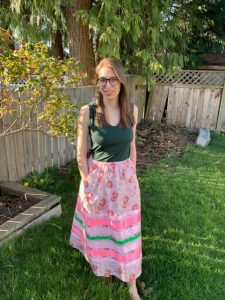6 Rachel Chong
Rachel Chong

Rachel Chong (she/her)
Taanishi kiiyawow. Rachel Chong dishinikashoon. Niiya Michif, ooschin Win Nipiy Pik. I would like to start by thanking Michif teacher Joshua Morin (Edmonton, AB) for teaching me our Métis language. In Michif I said: Hi, my name is Rachel Chong. I am Métis, from the Red River Settlement.
I am the third generation of my family to live on Coast Salish lands. While I am Métis on my maternal grandfather’s side, I also share the mixed settler-European heritage of three grandparents and the Chinese heritage of my in-laws. I am grateful to be currently living on the traditional territory of the Katzie, Kwikwetlem, Stó:lō, WSÁNEĆ, Kwantlen, and Stz’uminus Nations – which remains unceded – and the modern treaty territory of the Tsawwassen First Nation. I raise my hands in thanks to these host Nations for their historic and continued stewardship of the land. I also hold gratitude in my heart to these Nations for teaching newcomers’ (me included) good relations with this land and the First Peoples who live here.
I come to the field of Indigenous Librarianship in a round-a-bout way. Growing up as an urban Métis in BC, I was not strongly connected to culture or community. After completing my undergraduate degree, I was drawn to the University of British Columbia’s Master of Library and Information Studies program, because they offered a First Nations’ Curriculum Concentration, and I was eager to learn more about my Métis relations. After completing the program, I worked in public libraries in a number of capacities, which included support to public schools Indigenizing curriculum work. When I saw the posting for Indigenous Engagement and Subject Liaison Librarian at Kwantlen Polytechnic University, I was drawn to the position. I saw an organization that was sincere in their desire to make change. I saw an opportunity to create impactful work. I also saw an opportunity to deepen my connection with local First Nations and the local Métis community.
When Educational Studies (EDST) Instructor Dr. Lilach Marom approached me in Spring 2021 to support student research regarding a class assignment on Indigenous resources for instructional use, I was delighted to share. Lilach felt that the student submissions from this assignment were of high quality and would be of interest to current and future instructors. She proposed we write a President’s Diversity and Equity Committee (PDEC) grant to hire students to help edit this work and make it publicly available. I am so delighted to support student editors Michelle Souliere and Katelyn Bouvier’s work on this book. They have done such a tremendous job editing the work of their classmates, to create a cohesive and succinct work. I hope that this resource proves useful to instructors and that it helps guide respectful, culturally appropriate Indigenous resource use. As always, my heart is filled with gratitude to be doing this work alongside such genuine and sincere colleagues. Maarsi & thank you.
-Rachel

